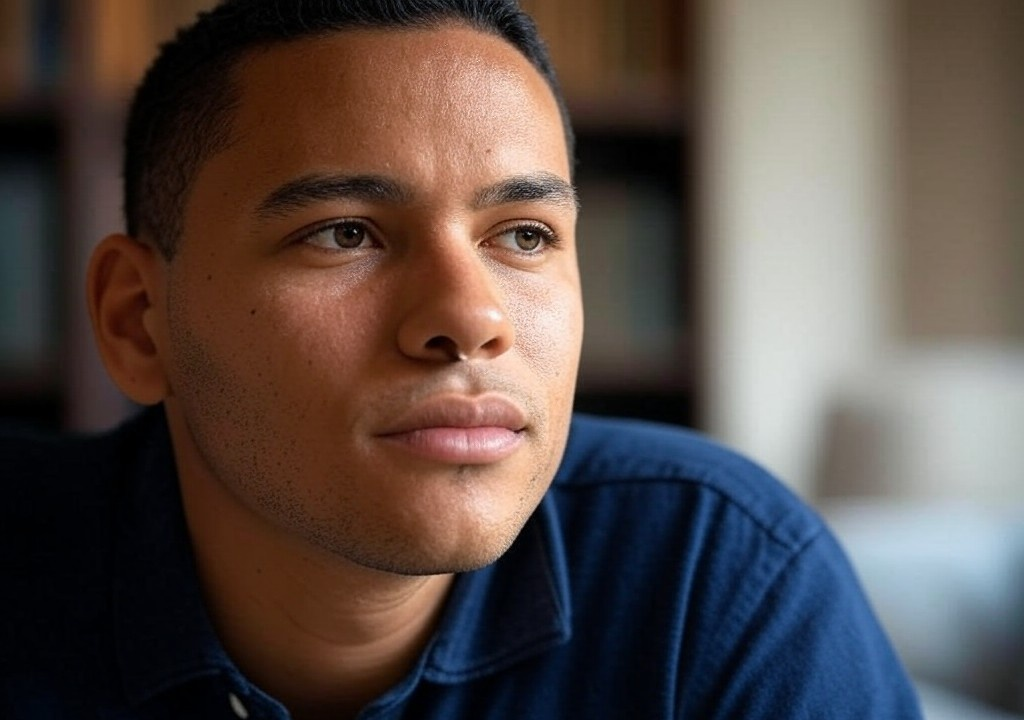The Hardest Piece I’ve Ever Written
The Storm Before the Calm
There’s a moment when you sit down to write, and your brain decides to throw a full-on quinceañera in your head—confetti, cumbia, cousins gossiping in the corner. Total chaos. That was me, staring at a blank document with the assignment to write about love in the face of loss. I remember that coffee shop in Chicago: the dim buzz of indie folk music, coconut milk latte growing cold, me staring at a cursor that blinked like it was mocking me.
Let me back up. I’d just lost my abuelo—my hero, a poet in everything he said but never wrote. He was the source of my family’s love stories: how he met my abuela by offering her a mango from a tree he shouldn’t have been climbing; how they built a life in Miami with nothing more than a shared dream, a pair of folding chairs, and a whole lot of faith. His stories had been the backdrop of my life, and now he was gone.
Everything in me wanted to curl up in this grief and do absolutely nothing. But I had a job to do. Relationships, love, heartbreak—it’s what I write about. And here I was, being asked to squeeze words out of a broken heart. Spoiler alert: I managed to do it. But hoo boy, it was like trying to salsa dance in quicksand.
Love is Messy (And That’s Okay)
You know what no one tells you about writing—or love, for that matter? It’s never exactly neat. If love were a perfectly curated Instagram grid, it would not include the sweaty, ugly-cry moments. The pieces of life when you feel like you’ve been shattered into five million pieces, trying to glue them back together with off-brand superglue.
Turning my abuelo’s passing into something I could write about forced me to confront that messiness. I couldn't pretend I had any answers at the time. Love gets awkward and painful and, yes, heavy. Love doesn’t just live in grand gestures or sunny days but in the cracks, the moments when someone holds your hand while you’re falling apart. Writing that piece made me think about how deeply we need connection to get through those moments—and how hard it can be to admit that.
For example, I thought about the first time I saw my abuelo cry. It was after my parents moved out of their first house, the one all of us had shared as a family. He sat in the corner of the emptied-out living room and cried into a bandana. I was nine, and it felt unnatural, even scary, to see someone so strong crumble. But later, I understood: that house was love to him. It was Sunday arroz con pollo, domino games that got way too competitive, the radio playing Celia Cruz while my cousins and I built forts with cushions we weren’t supposed to touch.
Grief is what happens when you’ve loved something so deeply that it changes the texture of your life. And, in retrospect, learning to embrace that grief—accept it, even—was the most profound love lesson I could have passed on to my audiences.
Breaking Down the Tough Stuff
That assignment? It turned into the kind of piece I didn’t think I could craft until I did. I wrote about love that doesn’t end, even when the person is gone. Love’s ghosts visiting us in memory, in quiet moments, in dreams that feel more real than they have any right to be.
Here's what the process taught me, in case you ever find yourself creating—be it art, friendships, or memories—from the rubble of heartbreak:
- Acknowledge The Chaos: Whether you’re navigating grief or just a tricky patch in a relationship, don’t sanitize it for the sake of appearances. Life’s not a Disney rom-com, so ditch the expectation of perfection.
- Channel the Love: I didn’t just write about loss; I wrote about what my abuelo gave to me. His stubborn belief that love is worth chasing, always. The mangoes he smuggled out of backyards for my abuela? Iconic. Make space in your heart to remember, not just to ache.
- Lean on Your People: I let my sister read drafts. She cried in the middle of a T.J. Maxx aisle and called me in a fit of mascara-streaked emotions. It wasn’t just about the words I’d written; it was about realizing that talking, sharing, connecting—and, let’s face it, ugly crying—are essential to healing.
Why The Hard Stuff Matters
It’s strange now to think about how that story—the hardest piece I’ve ever written—shaped who I am today. Since then, I’ve treated every tough situation in love (or in writing) as an opportunity to learn something profound.
When I eventually shared the piece, the response stunned me. Emails from strangers landed in my inbox: more mango stories, tales of grandparents who fell in love despite the odds and stayed together through decades of struggle. One person wrote to tell me how the essay inspired them to reconnect with their estranged mother.
I realized then that the hardest topics are also the ones that make us universal to each other. Love isn’t exclusive to romantic candlelit dinners and laughter on Ferris wheels. It’s the tie we can’t cut, even when it’s frayed, messy, or shapeless.
Moving Forward—With Grace
Maybe it’s not a coincidence that this article you’re reading now—the one about “the hardest piece” I’ve written—is another vulnerable confession. Here’s my reminder to you, though: tackling the tough stuff doesn’t just make you a stronger writer, partner, or friend. It makes you real.
As for me, the person I was when I started that story was different from the one I became by the end of it. Writing cracked me, sure—but it also forced me to glue myself back together stronger (and maybe a little snarkier than before).
So, whether your “hardest piece” is saying goodbye to someone you love, or just trying to help a relationship survive a very ill-advised game of Monopoly (seriously, don’t do it), know this: the mess is part of the masterpiece. Write it. Live it. Love it.
And if you’re lucky, it’ll feel like someone handing you a mango—a gift of sweetness you didn’t think would reach you.




















